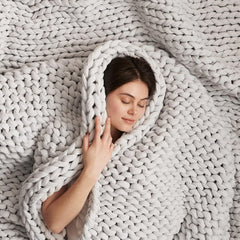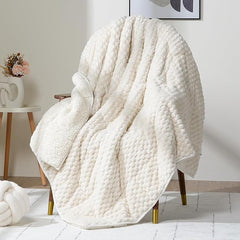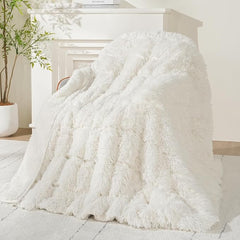How Weighted Blankets Help ADHD Brains Sleep Better
I Didn’t Realize How Much ADHD Was Affecting My Sleep—Until I Fixed It
For as long as I can remember, sleep felt like a battle I was destined to lose. I’d lay in bed, eyes shut, hoping—begging—for my brain to shut off. But it never did. Thoughts raced. My legs twitched. The blankets never felt right.
I told myself this was just ADHD. That some people sleep easily, and some people—people like me—just… don’t.
Until I realized that wasn’t true.
The Sleep Struggle That No One Talks About
For years, I accepted my sleeplessness as part of life. It was just the way things were. I relied on caffeine, pushed through exhaustion, and convinced myself I could function on minimal rest.
But deep down, I knew the truth.
I wasn’t just tired—I was burned out. My focus was slipping. My mood was unpredictable. And worst of all, I felt powerless to change it.
I tried everything—cutting out caffeine, sticking to a bedtime routine, even meditation. Nothing worked.
Then I heard about weighted blankets.
At first, I dismissed it. How could a heavy blanket solve a lifetime of sleep issues? But at that point, I was willing to try anything.
I Thought It Was Just a Blanket—Until I Tried It
The first night I used a weighted blanket, something was different.
I still had racing thoughts, but my body felt anchored in a way it never had before. My usual tossing and turning? Gone. It wasn’t a magic fix, but for the first time in a long time, I felt like my nervous system was actually settling down.
Over the next few nights, I started falling asleep faster. I wasn’t waking up every hour. And slowly, I began to realize just how exhausted I had been for years.
It wasn’t just about sleep—it was about my ADHD brain finally getting the chance to rest.
Why ADHD and Sleep Don’t Get Along
If you have ADHD, you’ve probably been told to stick to a routine, limit screen time, and avoid caffeine before bed. But the real issue isn’t just about habits—it’s biological.
People with ADHD often experience:
- ✅ Racing thoughts that make it impossible to wind down
- ✅ Restlessness and fidgeting that keep the body from relaxing
- ✅ Delayed melatonin production, making it harder to feel tired at the right time
- ✅ Sensory sensitivity, where blankets, sheets, or even the air in the room feel “wrong”
The problem isn’t just falling asleep—it’s getting the brain and body to slow down enough to stay asleep.
The Science Behind Weighted Blankets
Weighted blankets use deep pressure stimulation (DPS)—a gentle, evenly distributed weight that helps the nervous system shift into relaxation mode.
When your body experiences deep pressure, it can:
- ✅ Lower cortisol (stress hormone) – Helping you feel less anxious and overstimulated
- ✅ Increase melatonin (sleep hormone) – Making it easier to fall asleep naturally
- ✅ Boost serotonin (mood stabilizer) – Helping regulate emotions and focus
For ADHDers, this combination is a game-changer. It’s not about forcing sleep—it’s about giving your brain the conditions it needs to finally let go.
More Than Just a Sleep Hack
At first, I only used my weighted blanket at night. But I quickly realized it wasn’t just for sleep.
Now, I use it when I need to:
- ✅ Calm down after a stressful day
- ✅ Focus while reading or working
- ✅ Ease sensory overload when the world feels too loud
It’s become one of the few things that reliably helps me feel grounded—even in the middle of a chaotic day.
Is It Worth Trying?
If you:
- ❌ Toss and turn at night
- ❌ Feel wired when you should be winding down
- ❌ Wake up feeling exhausted, even after a full night’s sleep
Then yes, it’s absolutely worth trying.
There’s no one solution for ADHD sleep struggles. But sometimes, the right tool can make all the difference.
If you’re ready to finally experience real rest, check out the Bearaby Cotton Napper. It’s a premium, breathable weighted blanket that won’t trap heat—perfect for ADHDers who need comfort without overheating.
✨ Sleep doesn’t have to be a struggle. Give yourself the chance to finally feel rested. You deserve it. ✨



